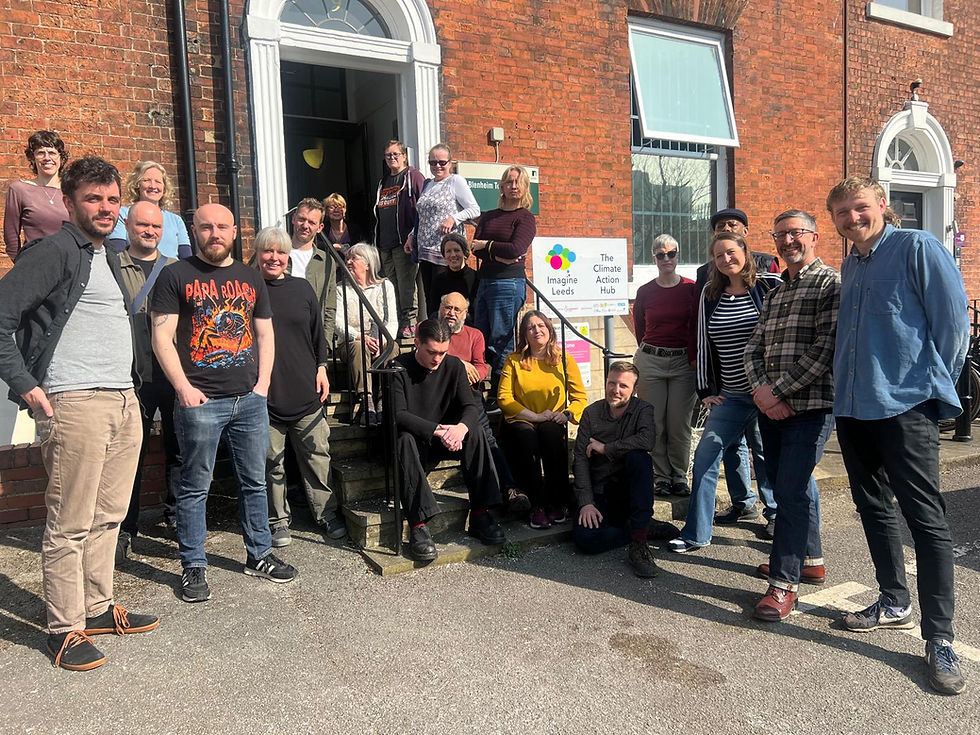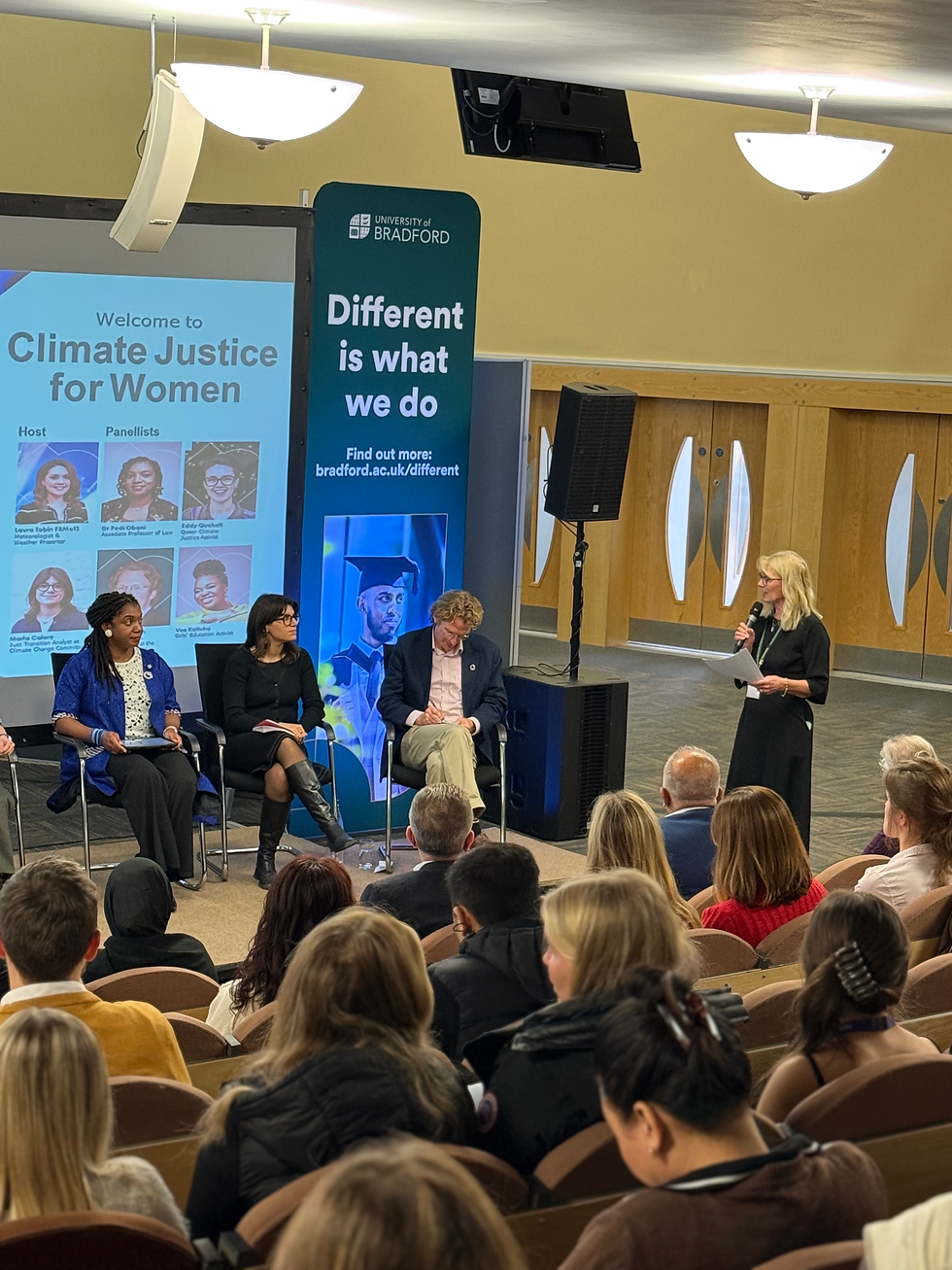Pioneering a university-community collaborative space
- Aug 13, 2025
- 5 min read

By Alice Tenney (Sustainability Service, University of Leeds)
Imagining a different kind of space on the University of Leeds campus
At times, studying or working at a university can feel a bit like you are living in a bubble. For staff, this can mean our work often feels insular, being siloed within the department or school in which we reside. For students, this can inform our daily life, with our education, social lives and identity being contained within the University of Leeds sphere. This feeling can also be reflected in our physical spaces. There is an institutional air that permeates throughout the entire campus, making the space feel distinctly separate from the outside world. This isolation can be seen to have negative implications in regards to the University's relationship and ability to work with the wider community. This is a major challenge for the holistic environmental and social responsibility work that the University has a duty to deliver.
Rooted in a long history of civic-focused work at the University of Leeds, as part of my student placement year in the University’s Sustainability Service, I underwent a project to find a solution to this problem. Based on my research, we propose the development of a civic gateway. This would be a dedicated space on campus for civic and community engagement – where staff, students and community partners can come together, share ideas and collaborate on social and environmental problems. This civic gateway space would be run by community partners, for the community. It would disrupt power hierarchies, foster creative solutions and allow for the development of more mutually beneficial relationships between the University and local community.

Project overview: Creating the foundations for a civic gateway space
In January 2025, a project team of representatives from the University of Leeds Sustainability Service (myself, Dr Rebecca Brunk, Dr Tasha Aylett, and Jane Dickinson), School of Geography (Professor Paul Chatterton) and community partner Climate Action Leeds (Simon Dixon and Andy Goldring), met to discuss the development of a living lab project looking into the value of collaborative civic-university spaces. I was to lead on the project as a development opportunity outside of my communications role.
Our focus was Imagine Leeds: the climate action hub (a dedicated space for the Climate Action Leeds city-wide network). Having recently moved into a campus-based location in 9 Blenheim Terrace in November 2024, our project assessed the benefits of Imagine Leeds for the University of Leeds community. I collected data through a series of stakeholder interviews, student and researcher focus groups, and quantitative usage data from a 20-week period. From this data, I evaluated the extent to which Imagine Leeds contributes to key University of Leeds priorities and areas of work such as: research, teaching and learning, student experience and recruitment, sustainability aims, and civic responsibility.
1. Increased academic excellence and multi-sector collaboration
Bringing together over 52 organisations from across the public, private and third sectors, Imagine Leeds acts as a cross-sectoral meeting point for organisations to collaborate in the field of sustainability. It has helped rewrite the dynamic between the University and wider community, creating more mutually beneficial relationships in research, strategy and the delivery of sustainability projects.
2. Opportunities for innovative teaching and learning
Imagine Leeds allowed for the development of new teaching formats, encouraging more interdisciplinary, experiential, and active learning. The students we spoke to highlighted the benefits this has had on developing skills for the future and feeling more seen by lecturers.
3. Improved civic engagement and responsibility
As an anchor institution this is one of the largest duties the University has. Imagine Leeds has increased the staff and student engagement with the community as well as community engagement with the University. The interviews particularly emphasised the role of community engagement in helping students to feel more rooted and grounded within their University’s city.
The project findings were written up into a short report (Pioneering a civic gateway space on campus final report (pdf)) which ultimately makes the long-term recommendation of developing a civic gateway at the University that is run in partnership with the community. In the short term, we recommend that the University extends its support for Imagine Leeds on campus, which is currently due to end in September. The report has been delivered to senior leadership in the Facilities Directorate to make a case for a civic gateway to be embedded into the Campus Reimagined project (a long-term development plan for the University estate).

On my experience: collaboration, experiential learning and responsibility
In my research, I identified several benefits of Imagine Leeds for the University community. These benefits align to positive outcomes I have felt personally in my experience of leading on this project as part of my placement.
Collaboration sits at the heart of this project. It was woven into its very fabric, from conception to its final recommendation of a space run in partnership. Engagement, active listening and locally-grounded work is the only way forward in terms of the University improving its relationship to the hyperlocal. While it can be tricky to balance a variety of voices and opinions, researching within a partnership has helped me to think more critically about the work I have been doing. It has allowed me to produce a more well rounded, thorough and evaluative report. I have learnt lots about diplomacy and how to best achieve our goals given the competing priorities of different parties and the larger institution.
On top of collaboration, I have learnt a number of other skills through experiential learning: from gaining confidence in leading team meetings, to balancing the wishes of multiple stakeholders in a succinct report, and finally hosting a presentation and discussion with senior colleagues. It has been a great experience in aiding my professional development and increasing the skills I have gained through completing my placement.
As well as the professional skills I have developed, I have developed a stronger sense of responsibility and more nuanced understanding of the complex relationship between my own position as a student and the wider community. I resonated with many of the student participants who displayed dissatisfaction with their lack of community engagement over their time in Leeds. Throughout this project I have evaluated my own connection to place and community in Leeds, outside of the University sphere. I think often as people – particularly as students – we forget that we do not exist in a vacuum. We are inextricably tied to the communities of people and other beings that we share our environment with, and this needs to be reflected in how we live, study and work. With such acknowledgement and change, I believe the kind of environmentally stable and socially just future we all deserve will fall within reach.
Conclusion
This research project has proven the benefit of an improved civic-university relationship for staff, students and the community. A civic gateway will enhance collaboration, empower individuals to learn and get involved, and help foster a more interconnected Leeds.
In this period of institutional development and ‘reimagining’, where key developing strategies reference a commitment to develop a more strategic and impactful approach to our civic and regional engagement, a civic engagement space on campus could be a crucial part of the answer. Not only to aid the University in achieving its civic, climate and sustainability goals, but also to ensure that the next generation that are passing through its doors take with them an ethic of sustainability and have the skills and experience to tackle the ever-increasing challenges that our city, and our world, faces.
To find out more about the project please feel free to read the final report or get in touch with a.e.tenney@leeds.ac.uk or alternatively sustainability@leeds.ac.uk.





Comments